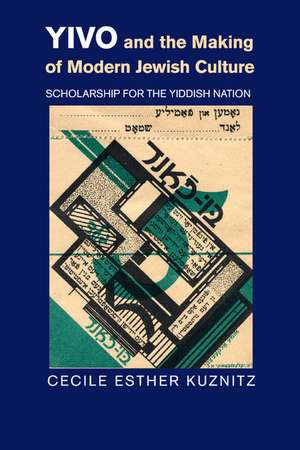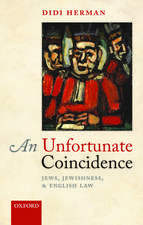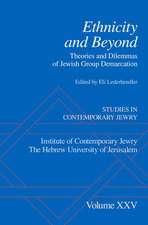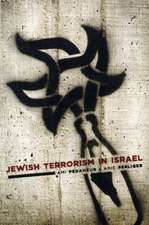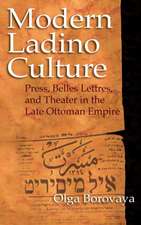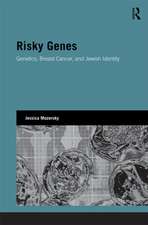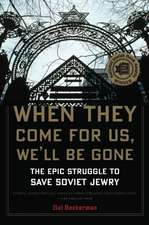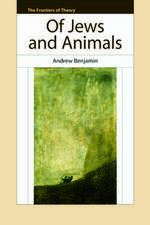YIVO and the Making of Modern Jewish Culture: Scholarship for the Yiddish Nation
Autor Cecile Esther Kuznitzen Limba Engleză Paperback – 13 sep 2017
| Toate formatele și edițiile | Preț | Express |
|---|---|---|
| Paperback (1) | 289.78 lei 6-8 săpt. | |
| Cambridge University Press – 13 sep 2017 | 289.78 lei 6-8 săpt. | |
| Hardback (1) | 695.06 lei 6-8 săpt. | |
| Cambridge University Press – 20 apr 2014 | 695.06 lei 6-8 săpt. |
Preț: 289.78 lei
Nou
Puncte Express: 435
Preț estimativ în valută:
55.45€ • 57.55$ • 46.35£
55.45€ • 57.55$ • 46.35£
Carte tipărită la comandă
Livrare economică 17-31 martie
Preluare comenzi: 021 569.72.76
Specificații
ISBN-13: 9781316634837
ISBN-10: 1316634833
Pagini: 323
Ilustrații: 16 b/w illus.
Dimensiuni: 155 x 230 x 20 mm
Greutate: 0.5 kg
Editura: Cambridge University Press
Colecția Cambridge University Press
Locul publicării:New York, United States
ISBN-10: 1316634833
Pagini: 323
Ilustrații: 16 b/w illus.
Dimensiuni: 155 x 230 x 20 mm
Greutate: 0.5 kg
Editura: Cambridge University Press
Colecția Cambridge University Press
Locul publicării:New York, United States
Cuprins
Introduction; 1. 'Language raised to the level of a political factor': Yiddish scholarship; 2. 'The idea of the institute is already ripe': the founding and first stages of YIVO, 1924–5; 3. 'From the folk, for the folk, with the folk': academic work, 1925–32; 4. 'The capital of Yiddishland': the geography of Jewish culture, 1925–33; 5. 'To forge intellectual weapons for our people!': scholarship in times of crisis, 1931–9; Epilogue: from Vilna to New York; Conclusion.
Recenzii
'Vilna was the capital of Yiddishland and the YIVO was its crown jewel. This excellent study by Cecile Esther Kuznitz shows how scholars and community activists in interwar Poland overcame daunting challenges to turn the YIVO into a great pillar of Jewish secular culture and scholarship. It is an inspiring and important story.' Samuel D. Kassow, Trinity College, USA
'This rich account of the achievements and travails of Yiddish scholarship at its height compels us to rethink Eastern European Jewish culture as a whole. Kuznitz shows us that secular Yiddishism, for all its limits, could also provoke tremendous popular enthusiasm. With her matchless knowledge of the old-new Jewish Vilna in which YIVO took root, she shows us the signal importance of place in Jewish diasporism. And her deep understanding of Polish Jewry's hopes and woes alike renders her account of YIVO's struggles to square scholarly integrity with the imperatives of nationalism, socialism, and popular obligation not only thought-provoking, but genuinely moving.' Kenneth B. Moss, The Johns Hopkins University
'This long-awaited book by Cecile Esther Kuznitz fills an important piece in the puzzle of the history of modern Jewish scholarship. We now have a full and rich account of the rise, fall, and rise of YIVO, the great center of Yiddish research. Kuznitz makes use of a wide array of sources, including previously inaccessible archives, to trace the intriguing personalities, trying material conditions, and key achievements of YIVO. Above all, she illumines with a commendable mix of empathy and precision YIVO's pendulous swing between the Scylla of political partisanship and the Charybdis of the ivory tower.' David N. Myers, University of California, Los Angeles
'One of Eastern European Jewry's most important pre-Holocaust institutions has finally found its historian. Cecile Esther Kuznitz comes neither to bury nor to praise YIVO, but rather to tell its story in all its complexity and tragedy. In this fine scholarly and readable work, she brings to life the personalities and politics that animated YIVO's lofty ambitions: to investigate and at the same time to create the Yiddish-speaking Jewish nation.' David Rechter, University of Oxford
'This is the story, never told at length before, of YIVO, one of the most significant institutions of Jewish (Yiddish) culture … This scholarly work offers a detailed history.' The Canadian Jewish News
'Before [Kuznitz's] work there was no comprehensive scholarly biography of this institution in its historical, cultural-historical and political context … This richly detailed and informative book can be used reliably by anyone working on East European Jewish history, Yiddish culture and its transmission.' translated from Jiddistik Mitteilungen
'Built upon years of meticulous research and written in precise, clear prose, Kuznitz's book is a lively work of scholarship about … scholars. She judiciously weighs the YIVO's many accomplishments against its enormous challenges and makes major contributions to Jewish intellectual history, Yiddish cultural history, and … to the history of Jewish archives and libraries. Her outstanding book would surely have made the YIVO founders, zamlers, and many adherents in the Yiddish nation and beyond, proud.' Yermiyahu Ahron Taub, Association of Jewish Libraries News
'Reading [this book], for the first time one understands in its entirety how the world of YIVO was created and the institute's immeasurable value for an entire generation of Jews in Eastern Europe … Kuznitz succeeds not only in reconstructing many small pieces of the mosaic of the institute's history, but … in composing a complete picture of YIVO's broad impact … [she] has succeeded magnificently in reconstructing a part of this destroyed world and bringing it back into public awareness … This book's most important contribution is in reminding us of the great vision of diaspora nationalism and its cultural and political relevance for East European Jewry's path to modernity.' Elisabeth Gallas, translated from Medaon
'… a cogent and beautifully researched account of [YIVO's] beginnings between the World Wars: the act of collecting that was at its core, and the intellectual commitment to reframing Jewish culture that nourished the vision of its founders.' Forward (forward.com)
'[Kuznitz's] analysis is astute, and her judgments solid and thoughtful. She deserves kudos for having written an exemplary academic study … It is likely to remain indispensable to scholars interested in Yiddish studies, and, more generally, in the development of Jewish studies, for a long time to come.' East European Jewish Affairs
'[I]nvaluable and engaging … YIVO and the Making of Modern Jewish Culture is essential reading for anyone interested in the history of Yiddishism, the cultural politics of eastern European Jewry, and the development of language-centric nationalism in general.' Journal of Jewish Languages
'In this superbly written book, Cecile Esther Kuznitz not only shows how Yiddish scholars created a home for their work and for Diaspora Nationalists but also [pays] homage to them, even as she critically examines their work.' The Russian Review
'Cecile Esther Kuznitz has accomplished a remarkable work of research that reconstructs, through rigorous and thorough analysis of a considerable body of sources … the outstanding figures marking this great intellectual adventure and their major accomplishments, stimulated by an unwavering passion, but also by the sad feeling of the fragility of Jewish destiny and the obsession to safeguard a menaced culture at the edge of a precipice … a learned work, rich in unpublished documents and agreeable to read …' translated from Revue des études juives
'This book offers a meticulous examination of the birth of YIVO, the Yiddisher Visnshaftlekher Institut (Yiddish Scientific Institute), and its life in Europe before the Holocaust. The author has made a thorough study of correspondence between the Institute's founders and supporters, men mostly unknown to modern Yiddishists, as well as relevant periodicals … The book is exhaustive in its explication of YIVO's life in Europe, bringing all the facts together with notes, a bibliography, and an index … Highly recommended for academic and Yiddish-oriented collections.' Beth Dwoskin, Association of Jewish Libraries News
'Kuznitz's lucid study demonstrates the importance of YIVO as the first institution ever dedicated to researching the language, history, and culture of the Jews in Eastern Europe and in the countries of their immigration. Her meticulous analysis of YIVO's surviving institutional records carefully reconstructs the institute's ambitious emancipatory project of freeing the Yiddish language from its allegedly inferior status as a 'jargon' and bestowing it a respectable place among the European national languages.' Laura Jockusch, The American Historical Review
'This rich account of the achievements and travails of Yiddish scholarship at its height compels us to rethink Eastern European Jewish culture as a whole. Kuznitz shows us that secular Yiddishism, for all its limits, could also provoke tremendous popular enthusiasm. With her matchless knowledge of the old-new Jewish Vilna in which YIVO took root, she shows us the signal importance of place in Jewish diasporism. And her deep understanding of Polish Jewry's hopes and woes alike renders her account of YIVO's struggles to square scholarly integrity with the imperatives of nationalism, socialism, and popular obligation not only thought-provoking, but genuinely moving.' Kenneth B. Moss, The Johns Hopkins University
'This long-awaited book by Cecile Esther Kuznitz fills an important piece in the puzzle of the history of modern Jewish scholarship. We now have a full and rich account of the rise, fall, and rise of YIVO, the great center of Yiddish research. Kuznitz makes use of a wide array of sources, including previously inaccessible archives, to trace the intriguing personalities, trying material conditions, and key achievements of YIVO. Above all, she illumines with a commendable mix of empathy and precision YIVO's pendulous swing between the Scylla of political partisanship and the Charybdis of the ivory tower.' David N. Myers, University of California, Los Angeles
'One of Eastern European Jewry's most important pre-Holocaust institutions has finally found its historian. Cecile Esther Kuznitz comes neither to bury nor to praise YIVO, but rather to tell its story in all its complexity and tragedy. In this fine scholarly and readable work, she brings to life the personalities and politics that animated YIVO's lofty ambitions: to investigate and at the same time to create the Yiddish-speaking Jewish nation.' David Rechter, University of Oxford
'This is the story, never told at length before, of YIVO, one of the most significant institutions of Jewish (Yiddish) culture … This scholarly work offers a detailed history.' The Canadian Jewish News
'Before [Kuznitz's] work there was no comprehensive scholarly biography of this institution in its historical, cultural-historical and political context … This richly detailed and informative book can be used reliably by anyone working on East European Jewish history, Yiddish culture and its transmission.' translated from Jiddistik Mitteilungen
'Built upon years of meticulous research and written in precise, clear prose, Kuznitz's book is a lively work of scholarship about … scholars. She judiciously weighs the YIVO's many accomplishments against its enormous challenges and makes major contributions to Jewish intellectual history, Yiddish cultural history, and … to the history of Jewish archives and libraries. Her outstanding book would surely have made the YIVO founders, zamlers, and many adherents in the Yiddish nation and beyond, proud.' Yermiyahu Ahron Taub, Association of Jewish Libraries News
'Reading [this book], for the first time one understands in its entirety how the world of YIVO was created and the institute's immeasurable value for an entire generation of Jews in Eastern Europe … Kuznitz succeeds not only in reconstructing many small pieces of the mosaic of the institute's history, but … in composing a complete picture of YIVO's broad impact … [she] has succeeded magnificently in reconstructing a part of this destroyed world and bringing it back into public awareness … This book's most important contribution is in reminding us of the great vision of diaspora nationalism and its cultural and political relevance for East European Jewry's path to modernity.' Elisabeth Gallas, translated from Medaon
'… a cogent and beautifully researched account of [YIVO's] beginnings between the World Wars: the act of collecting that was at its core, and the intellectual commitment to reframing Jewish culture that nourished the vision of its founders.' Forward (forward.com)
'[Kuznitz's] analysis is astute, and her judgments solid and thoughtful. She deserves kudos for having written an exemplary academic study … It is likely to remain indispensable to scholars interested in Yiddish studies, and, more generally, in the development of Jewish studies, for a long time to come.' East European Jewish Affairs
'[I]nvaluable and engaging … YIVO and the Making of Modern Jewish Culture is essential reading for anyone interested in the history of Yiddishism, the cultural politics of eastern European Jewry, and the development of language-centric nationalism in general.' Journal of Jewish Languages
'In this superbly written book, Cecile Esther Kuznitz not only shows how Yiddish scholars created a home for their work and for Diaspora Nationalists but also [pays] homage to them, even as she critically examines their work.' The Russian Review
'Cecile Esther Kuznitz has accomplished a remarkable work of research that reconstructs, through rigorous and thorough analysis of a considerable body of sources … the outstanding figures marking this great intellectual adventure and their major accomplishments, stimulated by an unwavering passion, but also by the sad feeling of the fragility of Jewish destiny and the obsession to safeguard a menaced culture at the edge of a precipice … a learned work, rich in unpublished documents and agreeable to read …' translated from Revue des études juives
'This book offers a meticulous examination of the birth of YIVO, the Yiddisher Visnshaftlekher Institut (Yiddish Scientific Institute), and its life in Europe before the Holocaust. The author has made a thorough study of correspondence between the Institute's founders and supporters, men mostly unknown to modern Yiddishists, as well as relevant periodicals … The book is exhaustive in its explication of YIVO's life in Europe, bringing all the facts together with notes, a bibliography, and an index … Highly recommended for academic and Yiddish-oriented collections.' Beth Dwoskin, Association of Jewish Libraries News
'Kuznitz's lucid study demonstrates the importance of YIVO as the first institution ever dedicated to researching the language, history, and culture of the Jews in Eastern Europe and in the countries of their immigration. Her meticulous analysis of YIVO's surviving institutional records carefully reconstructs the institute's ambitious emancipatory project of freeing the Yiddish language from its allegedly inferior status as a 'jargon' and bestowing it a respectable place among the European national languages.' Laura Jockusch, The American Historical Review
Notă biografică
Descriere
This book is the first history of YIVO, an important center for Jewish culture and politics in the early twentieth century.
